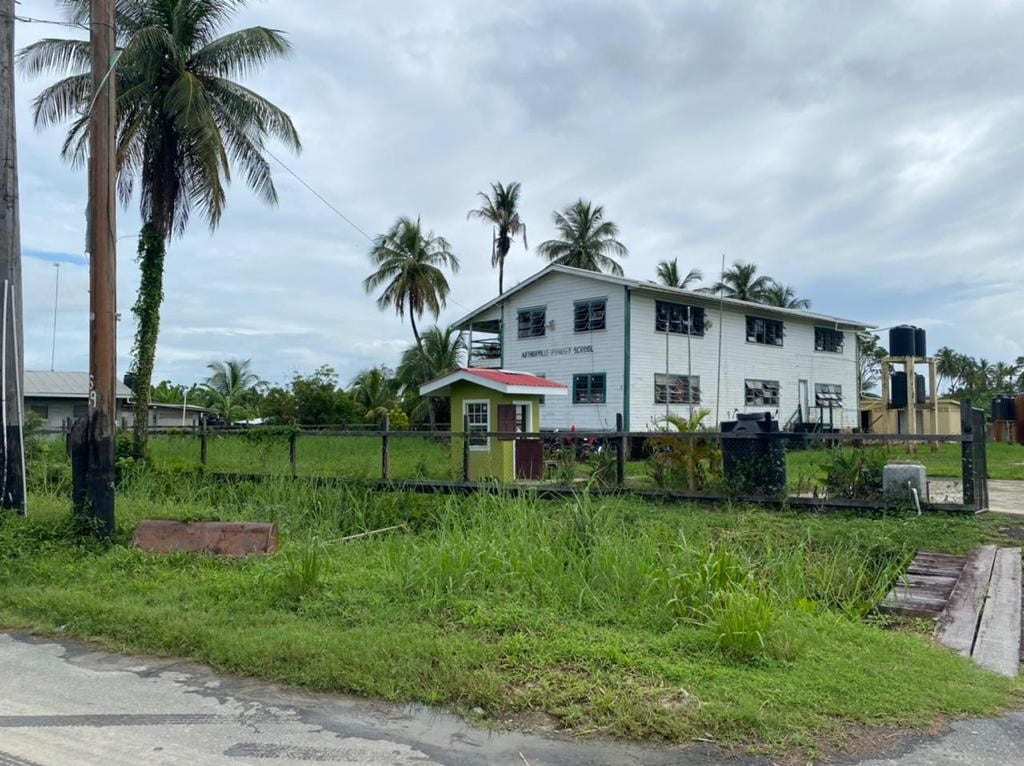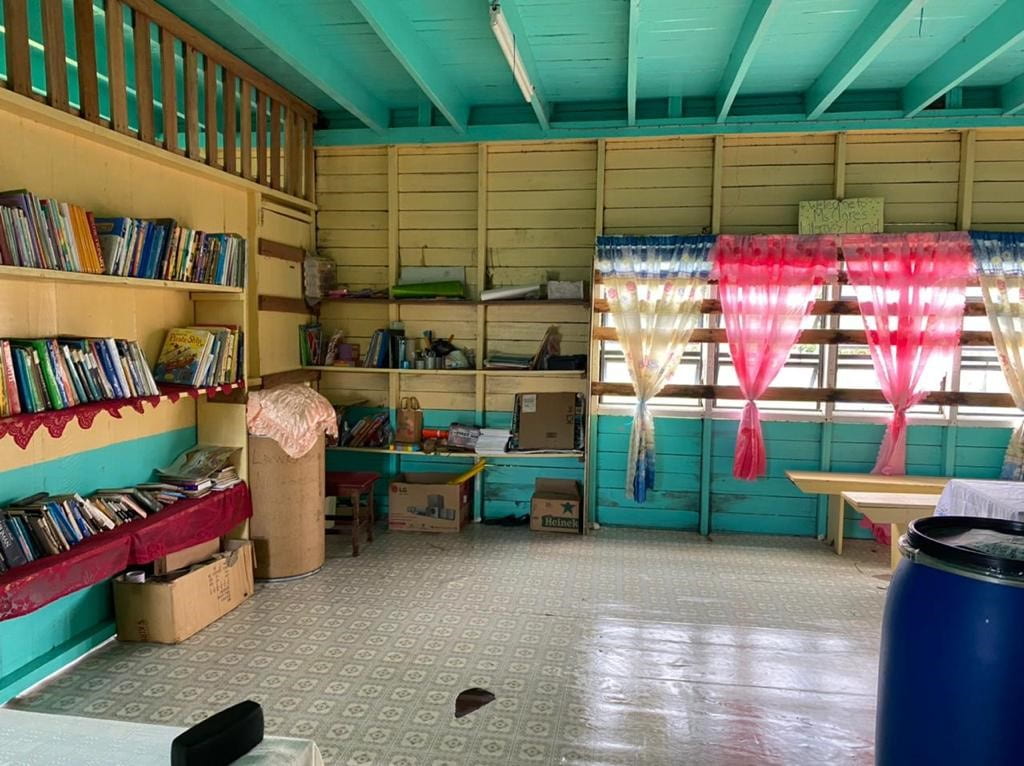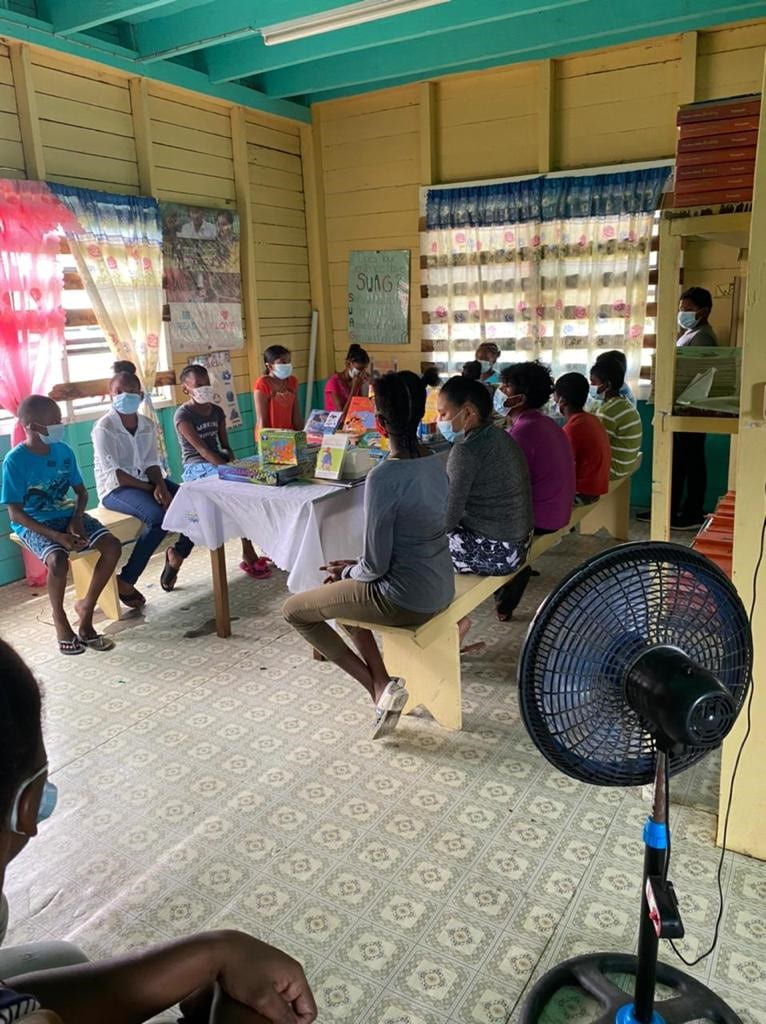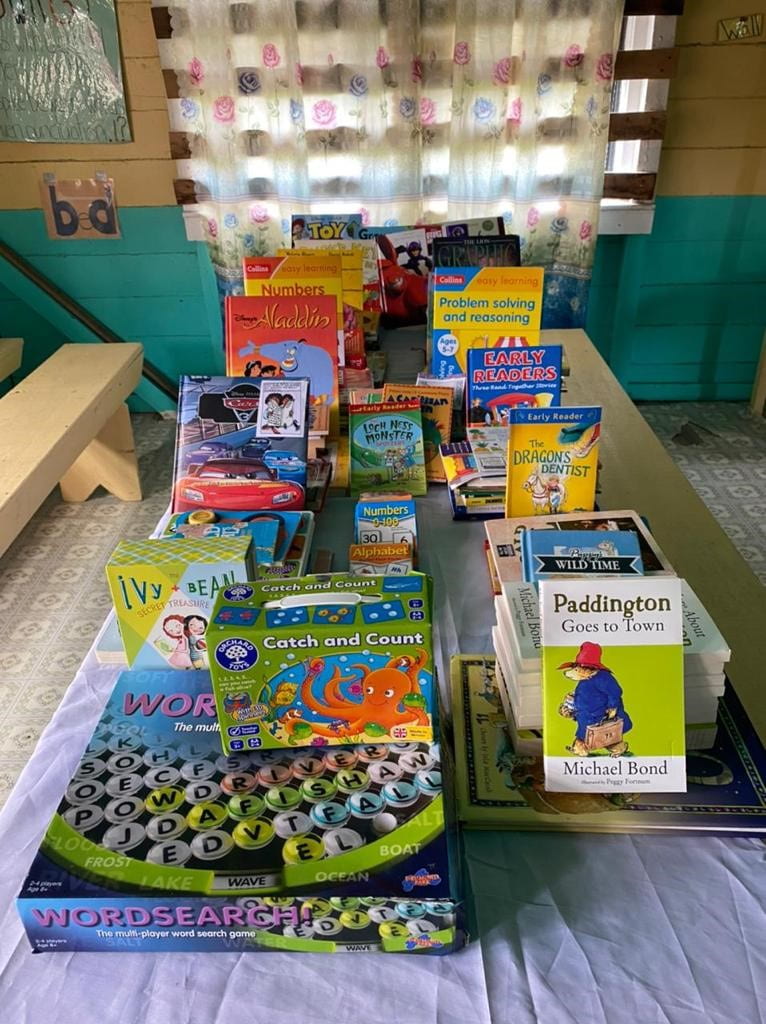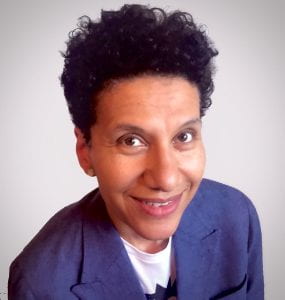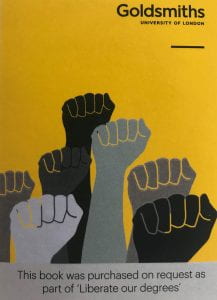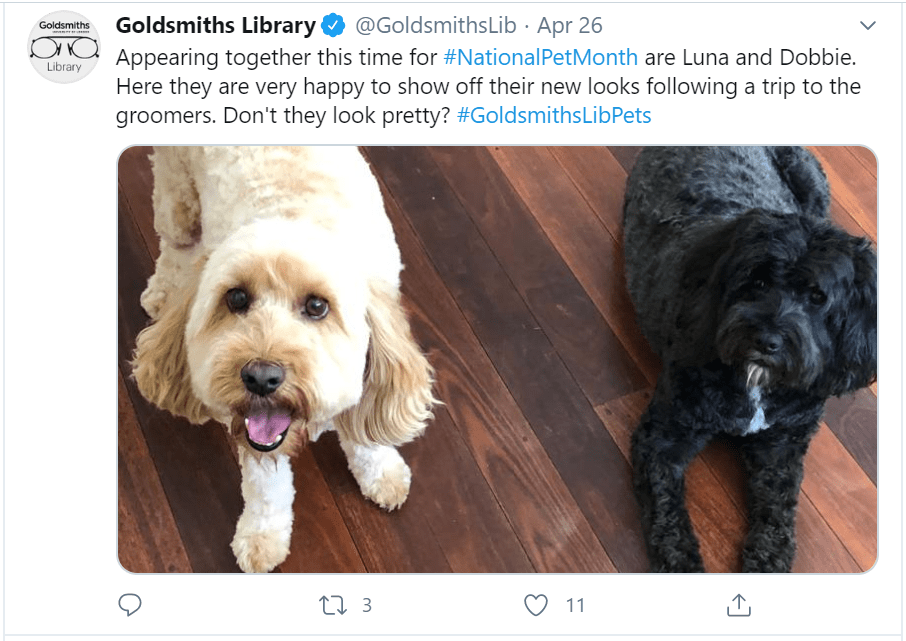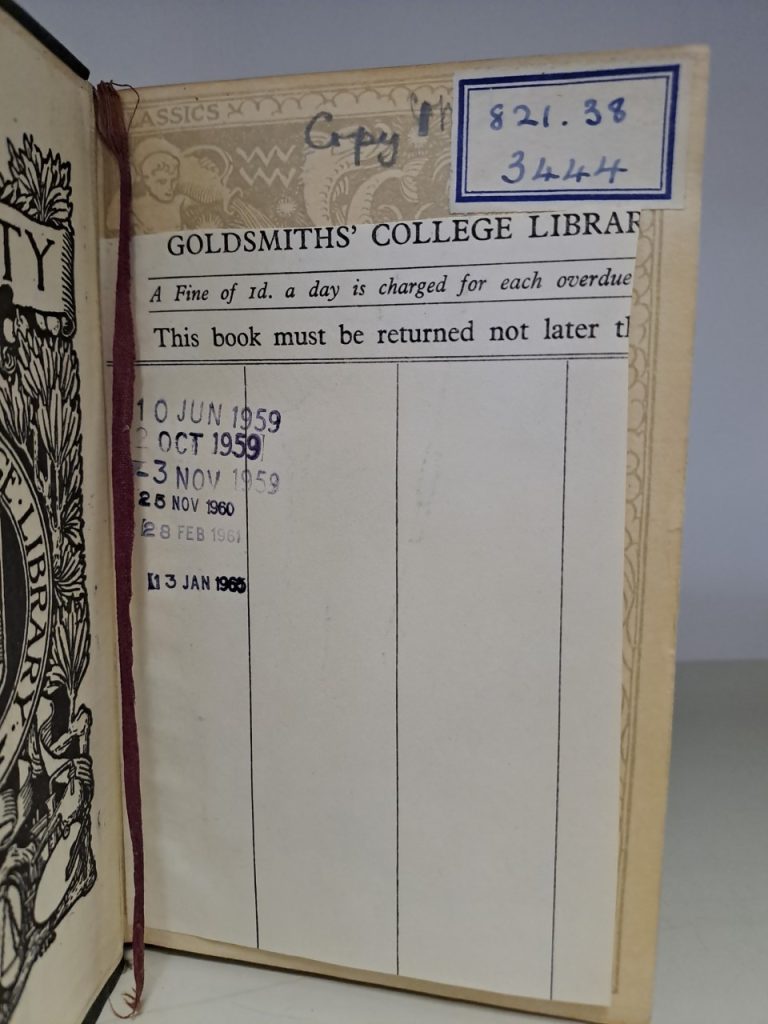
Primary page content
Library book returned to Goldsmiths 57 years late

Black History Month 2021: The Black Woman
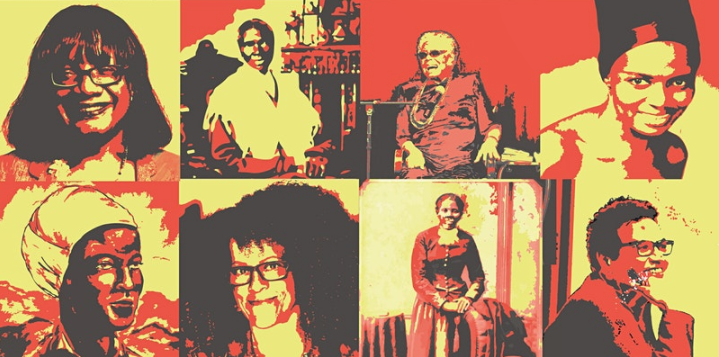
Top row, left to right: Dianne Abbott, Sojourner Truth, Maya Angelou and Miriam Makeba; Second row, left to right: Nanny, Bernardine Evaristo, Harriet Tubman and Jackie Kay
When you see a Black woman, what image does it conjure up in your minds eye? Be honest now, I would hazard a guess, admittedly dependent on who you are, but in general it is an image more pitiful than celebratory…well unless you are thinking of a pop-culture figure, but even with those transcendent figures their ethnicity or race is rather glossed over and rendered a non-fact. That’s how the media chooses to side-step uncomfortable truths and chooses to mass market an appeal for max profits. So Beyonce’s lyrics to “Formation” clearly referencing The “Black Power Movement” jarred and shocked her White fan base (See SNL’s hilarious ‘The Day Beyonce Turned Black’ The Day Beyoncé Turned Black- SNL – YouTube) and her “Brown-Skinned Girl” signalled that perhaps she had a racialised context that she cared about after-all, not just the melodious pop tunes that appealed to a fan base who did not understand the heritage that made her who she is.
In the rest world we are used to seeing Black women as our institutional cleaning staff, the cluster of students within particular subject disciplines (totally absent from others), as professional staffers, but there are yawning gaps and sparse representation at senior levels. In public life; political, financial, CEO-cliques, the upper echelons of health care, media, the judiciary even working across the Royal households and charities at senior level, it is truly painful particularly when you travel to the USA and see the sheer brilliance of representation across the board unlike the UK, Europe, and parts of the English-speaking world. In the British HE system we all know that the absence or near absence of Black women across the executive and senior executive is totally “normalised” irrespective of the EDI agenda which quite frankly has benefited every other “protected characteristic” and White women on the whole. As for significant representation on decision-making funding bodies, as research-leads, early career researchers, as departmental HoDs, it remains an intractable state of affairs.
Of course, the voices of Black women that work in HE testify loud and clear for those that really want to hear; so many testimonies of the micro-aggressions from colleagues and students alike. Made to feel out of place, a “space invader” to coin sociologist Nirmal Puwar’s term. Or conversely treated as exceptional, one minute lauded but the next encouraged to “stay in your lane.” Always having to justify oneself in a way that demonstrates value. Not encouraged to be innovative, or a “thought-leader” breaking new ground, as White peers would be-with the knock-on effect of a rapid rise. The odd heralded appointment then quick departure a little while longer with no accountability. Overlooked for promotion or actively discouraged to go for promotion. Or promotion when it comes taking twice as long than for White peers. The micro-management or overburdened with higher expectation to perform when compared to White peers. The subtly of being undermined, patronised, and gaslighted. Sound familiar to some? Again, I guess it depends on who you are and to whom you have bothered to ask those difficult questions of. It has all been chronicled time and time again. HE is a reflective microcosm of the larger society, and it ain’t changing anytime soon, if COVID working stories of BAME HE academics and professionals are anything to go by.1
However, this is the time to talk, the Black Lives Matter phenomenon has opened debate in the UK as elsewhere. The Rhodes Must Fall campaign is calling for accountability not only in representation of the figures of the past, but who it is that narrates the histories going forward. The “Ain’t I A Woman” conference platforms scholars who are researching the rounded and multi-faceted elements of Black women; mothers, grandmothers, adventurers, innovators, business people, teachers, activists and more in new and innovative ways. As part of Goldsmiths’ Library’s Black History Month series three Black British historians invite you to gather and join the palaver of scholars and notable women who together will present a nuanced view; past, present and future. As our celebrated Maya declared powerfully:
“They try so much
But they can’t touch
My inner mystery.
When I try to show them,
They say they still can’t see.
I say,
It’s in the arch of my back,
The sun of my smile,
The ride of my breasts,
The grace of my style.
I’m a woman
Phenomenally.
Phenomenal woman,
That’s me.
Now you understand
Just why my head’s not bowed.
I don’t shout or jump about
Or have to talk real loud.
When you see me passing,
It ought to make you proud.
I say,
It’s in the click of my heels,
The bend of my hair,
the palm of my hand,
The need for my care.
’Cause I’m a woman
Phenomenally.
Phenomenal woman,
That’s me.”
Extract Maya Angelou, “Phenomenal Woman” from And Still I Rise.
Author: Dr. Elizabeth Williams
References:
- See, Ahmed, S, On Being Included: Racism and Diversity in Institutional Life(Duke University Press, 2012), Bopal, K, White privilege: The myth of a post-racial society (Policy Press, 2018), D. Gabriel, Transforming the Ivory Tower: Models for gender equality and social justice (Trentham Books, 2020), Gabriel, D. et al Inside the Ivory Tower: Narratives of women of colour surviving and thriving in British academia (Trentham Book, 2017), Mirza, H. et al, Dismantling Race in Higher Education: Racism, Whiteness and Decolonising the Academy (Palgrave Macmillan, 2018), Puwar, N. Space Invaders: Race, Gender and Bodies Out of Place (Berg, 2004),
Notes:
Image designed for the conference ‘Ain’t I a Woman?: “The Black Woman” in Historical and Contemporary Context’, Goldsmiths, University of London, 2021, organised by Dr. Juanita Cox , Dr. Angelina Osborne and Dr. Elizabeth Williams.
1 Olive Morris, ‘STREET ART OF OLIVE MORRIS by BREEZE YOKO,’ by StockCarPete used under CC BY 2.0 / original image changed to: red, yellow and black.
2 Audre Lorde by Elsa Dorfman, used under CC BY-SA 3.0 / original image changed to: red, yellow and black.
3 Professor Wangari Maathai by Oregon State University used under CC BY-SA 2.0 / original image changed to: red, yellow and black.
4 Dido Elizabeth Belle by howard_morland used under CC BY 2.0 / original image changed to: red, yellow and black.
5 Diane Abbott by Chris McAndrew used under CC BY 3.0 / original image changed to: red, yellow and black.
6 Sojourner Truth by js used under CC BY-NC-SA 2.0 / original image cropped and changed to: red, yellow and black.
7 Maya Angelou by York College ISLP used under CC BY 2.0 / original image changed to: red, yellow and black.
8 Miriam Makeba, ‘MIRIAM MAKEBA PATA PATA 12” LP VINYL’ by vinylmeister used under CC BY-NC 2.0 / text removed, original image changed to: red, yellow and black.
9 Queen Nanny of the Windward Maroons by David Drissel used under CC BY-NC-SA 2.0 / original image cropped and changed to: red, yellow and black.
10 Bernardine Evaristo by Acthom123 used under CC BY-SA 4.0 / original image cropped and changed to: red, yellow and black.
11 Harriet Tubman by National Park Service used under CC BY-NC 2.0 / original image cropped and changed to: red, yellow and black.
12 Jackie Kay, ‘Paisley Book Festival – Jackie Kay 02’ by byronv2 used under CC BY-NC 2.0 / original image cropped and changed to: red, yellow and black.
Curating LGBTQ+ Lives Online for the UK Web Archive
I joined Goldsmiths University earlier this year as the Library Service Systems Assistant Technician. Alongside this, I also volunteer at the British Library (focused on games events and web archiving), and am also on the Committee for the CILIP (Chartered Institute of Library and Information Professionals) LGBTQ+ Network. Both British Library and CILIP volunteer roles now overlap through the LGBTQ+ Lives Online web archiving project, as I’m one of two co-lead curators on that project. As well as sharing the project here, I’ll also be presenting it in a Library all-staff meeting in June. And as June is Pride month, it’s an appropriate time to do that.
When the internet first rose to prominence in the late 1990s, one of the primary modes of communicating with others was through internet chat rooms and forums. Suddenly, isolated people all over the world with a personal computer and internet access could communicate with others ‘like them’. It is perhaps partly for the need to feel more connected with other people ‘like them’ that LGBTQ+ people adapted to online community-building quickly. Now, as we have been living online for over 25 years, it seems pertinent to consider what traces of early digital lives survive, and how we can begin to make sense of it. What survives of digital campaigns to legalise the age of consent for all sexualities in the UK (2001), gain recognition and protections of members of the trans community (Gender Recognition Act 2004) or the battle for marriage equality in the UK (England and Wales, 2013, Scotland 2014, Northern Ireland 2019)? As well as historical content such as this, we must also ensure we are ready and able to curate current and future online discussions and websites surrounding LGBTQ+ lives as well.
UK websites have been archived on a permissions basis since 2005 via the Shine interface. This changed with the implementation of Non-Print Legal Deposit Regulations. As a result, since April 2013, through the UK Web Archive, the British Library along with the other five UK Legal Deposit Libraries (National Library of Scotland, National Library of Wales, Bodleian Libraries, Cambridge University Library and Trinity College Dublin Library), has run an annual domain crawl of the UK web. Following on from this, in 2020, the British Library and Chartered Institute of Library and Information Professionals (CILIP) LGBTQ+ Network began a collaborative project to develop the LGBTQ+ Lives Online. This project tags and subject categorises relevant LGBTQ+ websites already in the UK Web Archive, and is expanding the scope of LGBTQ+ websites we collect for future generations.
The collection currently contains over 400 sites and web pages in the main collection, with more of these being added to sub-collections every week. Many of the sites were already in the UKWA before the collaboration began, but were not linked to sub-collections. We are still at the stage where we are developing the structure of sub-collections, but our initial indexes cover:
- Activism/Pride
- Arts, Literature, Music & Culture
- Business/Commerce
- Education
- History
- Health and Community
- Policy and Legislative Change
- Religion
- Social Organisations
- Sport
LGBTQ+ content was already part of the UK Web Archive before the collaboration began, with many sites in other UK Web Archive collections overlapping LGBTQ+ themes. For example, Black and Asian Britain (blackgayblog.com), Gender Equality (Beyond the Binary), Sport (Graces Cricket Club). And some sites cut across many collections, highlighting the intersectional nature of the UK Web Archive. For example, Gal-Dem features in the News Sites; Zines and Fanzines; Black and Asian Britain; Gender Equality; Women’s Issues; Unfinished Business: The Fight for Women’s Rights collections, as well as LGBTQ+ Lives Online. LGBTQ+ Lives Online, much like the lived experience of the LGBTQ+ community does not sit in isolation, disconnected from other aspects of UK offline and online life. LGBTQ+ people play a part in all aspects of the UK community, and are not solely defined by their gender or sexual orientation.
Since the launch of this collaborative project, we have been focused on a few areas to both develop the project and to preserve sites within the collection. This includes:
- Identifying sites already in the UK Web Archive to be added to the LGBTQ+ Lives Online sub-collections.
- Identifying new sites not already in the UKWA to be included in the collection.
- Spreading the word about the project as widely as possible via blog posts and articles such as this; social media; emails targeting specific LGBTQ+, library, and broader diversity organisations and networks.
We would especially like to see more nominations that reflect the multicultural nature of UK LGBTQ+ communities, including UK sites written in languages other than English.
Under the Non-Print Legal Deposit Regulations 2013, the UKWA can archive UK published websites, but are only able to make the archived version available to people outside the Legal Deposit Libraries Reading Rooms, if the website owner has given permission. You can browse through the collection here, and nominate a UK published site or webpage with a focus on LGBTQ+ lives to be included in the collection via: https://www.webarchive.org.uk/en/ukwa/info/nominate .
You can read more about the LGBTQ+ Lives Online project at: https://blogs.bl.uk/webarchive/lgbtq/
Ash Green (Goldsmiths Library, Systems Assistant Technician)
Steven Dryden (British Library)
UK Web Archive Lead Curators for LGBTQ+ Lives Online
Content in this post originally appeared on the British Library UK Web Archive blog, and has been adapted under a Creative Commons license.
How One Librarian Determined to Keep Purposeful and Productive During Lockdown
2020 was a tough year for us all, COVID blind-sided so many of us. If like me you lost a loved one- both parents in my case- during the year, after the initial shock my next step was how to manifest something positive out of the legacies of loved ones. Luckily for me it was education and the love of books and learning. I was in the right profession. I decided to work towards bringing to fruition a dream I had held for 5yrs. The focus was to pay it forward and sow the seeds of the love of learning to the next emergent generations of amazing adults.
The result was near 200 books (more to go) sent to Arthurville Primary School in Wakenaam Guyana, South America the land of my foremothers and forefathers on one side of the family. Friends and family donated including librarians from Goldsmiths Library who willingly donated withdrawn books of children’s literature, storybooks, science and more. Well done Librarians we did it again! The children are beyond excited to read the range of material which includes wallcharts and learning toys and tools. Although COVID proved to be a formidable challenge for the Guyanese, these donations which arrived in April 2021 has added to the motivation of many to keep keeping on with vision and hope-me included!
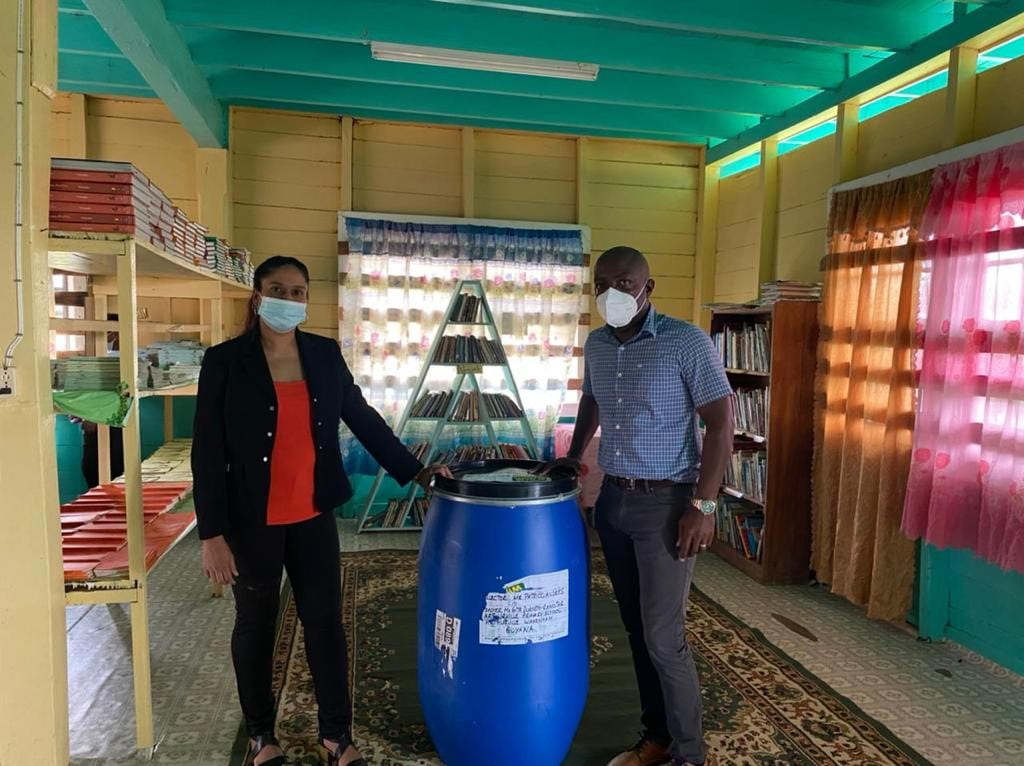
Mr Andries (my cousin) standing with the Headmistress Mrs Dudnath-Ramotar next to the barrel which carried the books from London to Georgetown Guyana.
Dr. Elizabeth Williams- Academic Support Manager
Useful legal guidance for all at Goldsmiths
Goldsmiths started teaching Law in 2019. This means that our library is now stocked with a whole array of resources that could also be of interest to non-law students and staff.
One of those is Practical Law which is a tool that is used by lawyers when drafting legal documents etc. It contains guidance and templates for a whole raft of things that you might find useful for your own interests.
Often we only need legal advice in challenging times, but before you entrust your situation to a lawyer, you might like to read some of the guidance on Practical Law.
For example, there is a large section on Family Law, which includes, amongst other things, guidance on the law of divorce and the law relating to surrogacy and adoption leave. But many other aspects of Family Law are covered too.
In addition there are standard documents, which are guided templates, showing you things like how to write a will.
There is also guidance on things like inheritance tax and on your legal responsibilities after a death of a loved one, and creating lasting powers of attorney.
Law can be quite hard to navigate around, but Practical Law can be a really useful tool to help you navigate these issues. There is even help for the workplace, e.g. guidance on copyright in an education setting and a whole section on employment law.
You can find links to Practical Law and all our other legal databases on the Law subject guide.
Greg Bennett, Subject Librarian for Law
Meet the new Director of Goldsmiths’ Library Services
Goldsmiths’ Library has a new person at the helm. Last month Marilyn Clarke was appointed the new Director of Library Services. Since Marilyn first joined Goldsmiths four years ago, she has been part of the team working on decolonising and diversifying the university’s collections and professional practices. Below she talks about this and plans for the Library to offer services again to the Goldsmiths community.
“First of all, I am delighted to have been appointed the new Director of Library Services. I joined Goldsmiths in 2016 as Head of Discovery Services, having formerly worked at both Imperial College, London and Senate House Library, where I cut my teeth as an on-the-job cataloguer.
“I had no intention of becoming a library worker, but I quickly realised that I loved academic libraries and being amongst a community of learners.
“Before actually joining Goldsmiths, my first experience of the institution was when I attended a drumming short course many years ago, which I thoroughly enjoyed. I recently attended a great comedy improvisation short course which was a lot of fun.
“Since joining Goldsmiths I have worked on the Liberate our Library initiative as part of the ‘liberate our degrees’ objective in the Learning, Teaching, Assessment Strategy 2017-2021. The aim of this is to decolonise and diversify our collections and professional practices in pursuit of greater representation of marginalised voices, through the practice of critical librarianship. This initiative also includes working alongside academic departments, supporting their own decolonisation efforts and working groups. The initiative is a major influencer in the library sector as well as being seen as an exemplar across Goldsmiths.
“In January, the Library co-led with Birkbeck, University of London and the University of East London, the Decolonising the curriculum: the library’s role conference, which attracted over 100 professionals from across the UK. I also spoke about this work at 2019’s ‘Decolonising Goldsmiths – mission impossible’ Black History Month event, where Sofia Akel launched her ‘Insider-Outsider’ report.
“Recently I led the procurement and launch of a new library management system, Symphony, to bring the Library’s backend operations into the 21st century, enabling the Library team to engage more effectively with new technologies both internally and externally. As part of the Discovery Services team I helped deliver the new discovery tool, LibrarySearch, and the popular laptop loans scheme.
“Beyond the Library, I am a member of the HR Equalities Committee (HREC) and a co-Chair of the Goldsmiths Race Equality Group (GREG). GREG has been actively engaging with the Warden’s Office, the Director of HR, and members of SMT to address the GARA commitments and the ongoing racial justice work, as well as establishing relationships with the Development and Alumni Office, Communications Department, and the newly appointed Dean of Students. I am also a member of the Anti-racism Training Working Group led by Dr Nicola Rollock, working toward mandatory anti-racism training for all staff to tackle institutional racism.
“I would like to say a huge thank you to the Library team for their hard work and dedication in supplying an excellent service to our user community. They are all a credit to Goldsmiths and continue to amaze me with their talents and creativity. Since lockdown they have successfully enhanced all our services, adapting to the new online learning and working environment, while simultaneously developing their skills to support learning and teaching.
“Over the next months, we will focus on supporting the delivery of ELearning as the new norm by: procuring more eBooks (availability and budgets allowing), sourcing more Open Educational Resources (OERs), scanning reading list materials (copyright allowing), providing academic skills support through workshops and 1:1s, and working side-by-side with departments. Everything we do will have parity of access in mind to take account of different learners’ needs.
“We are currently working towards a phased reopening of the Library, offering a limited set of services while ensuring a safe working environment and following all the current government guidelines. These initial services will be: returning books, scanning materials for reading lists, and setting up a click and collect service for print books. More news on this will be shared soon.
“Finally, as a Black senior leader in an HE and library sector, where there is very little representation of Black and People of Colour at this level, I would like to focus on changing this by exploring how the Library can work with local schools and the Careers Service to encourage young people to explore the range of career opportunities that libraries can offer.
“I am also a member of the CILIP (Chartered Institute for Librarians and Information Professionals) BAME Steering Group, established last year to support the advancement of BAME professionals in the workforce and the development of diverse library, knowledge and information services. The CILIP BAME Network is an important step in addressing the under-representation of Black and People of Colour within the national library and information workforce which identifies as 96.7% White.”
Getting Creative with Social Media
Elspeth Clarke, Reader Services Supervisor
Earlier this year, I was given the opportunity to take leadership of the Library Marketing Group. This was a great chance for me to not only become more involved in the general marketing that goes in the library, such as advertising events, promoting our services and creating flyers for Welcome Week, but it also meant I had the chance to come up with some fun and creative ways to engage with users via Social Media, in this case Twitter.
Since becoming the Chair of the Marketing group I have been involved in two campaigns that we have run. The first was based around World Book Day in March. As part of this, we decided that we wanted to tweet throughout the day about different books that had either inspired library staff or Goldsmiths students, or their favourite childhood books. This was done through staff contributing their books to a shared document, along with a short quote to why they love the book or the impact it had on them.
We also collected student’s favourite or influential books by posing the questions on the whiteboards near the entrance to the library, and waiting to see what they shared. Many of the books were part of our collection, so we took photos of the ones we had, and found images of the covers online for those we didn’t. These were then all compiled, and every book that was shared with us was then given it’s own tweet throughout the day. We also included the call number of the books if we had them in our collection, to make it easier for people to find them if inspiration struck and they wanted to read any of the books.
Another campaign that was incredibly fun to run was one we did for National Pet Month in April. This was slightly more challenging due to the lock-down, as it all had to be done via email and online calls. It also meant that we weren’t able to reach out to students in the usual ways about their pets. However, we did get a lot of photos back from staff that we gladly accepted and used to create our National Pet Month tweets. As we had a whole month, we did a tweet a day to highlight different pets and included a little story or personality trait with each tweet. This was a great way to share a bit of ourselves with other Goldsmiths staff and students as well as other University Library staff who follow our Twitter account. It was also a great way for us to get to know a bit more about some of our colleagues and get to look at cute photos of animals.
We were also able to use the photos we got in a creative and fun way on our temporary, dedicated COVID-19 Libguide by creating a section called Meet the New Co-workers! where you can scroll through a slideshow of staff pets (and a plant or two!) that are keeping library staff company while they work from home.
Lewisham Lit Society: Library book display
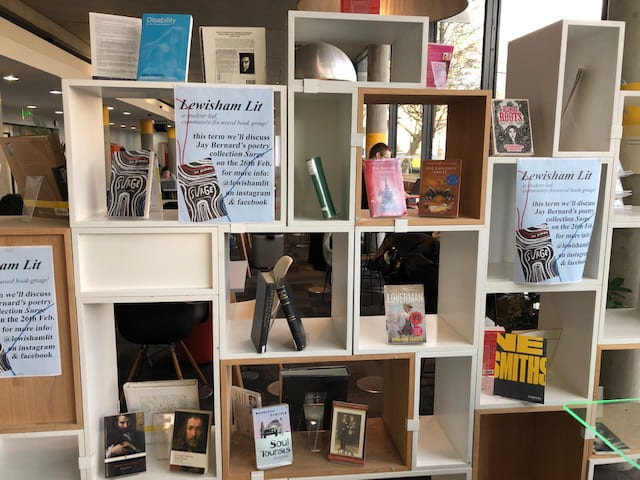
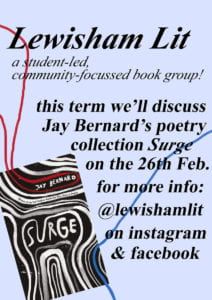 The Library curates regular book displays marking themes and events taking place at Goldsmiths. This month the Library has a foyer book display of writers being studied by a new Student Union society, the Lewisham Lit Society, to highlight the literary history of Lewisham and its vibrant contemporary writing scene. Lewisham Lit Society is a student-led, community focused book group which looks at books written by authors with a connection to the borough or which are set in Lewisham. This year they will be reading Candice Carty Willliams’ ‘Queenie’ (Carty Williams grew up in Lewisham) and Jay Barnard’s poetry collection ‘Surge’, which takes inspiration from the New Cross fire of 1981.
The Library curates regular book displays marking themes and events taking place at Goldsmiths. This month the Library has a foyer book display of writers being studied by a new Student Union society, the Lewisham Lit Society, to highlight the literary history of Lewisham and its vibrant contemporary writing scene. Lewisham Lit Society is a student-led, community focused book group which looks at books written by authors with a connection to the borough or which are set in Lewisham. This year they will be reading Candice Carty Willliams’ ‘Queenie’ (Carty Williams grew up in Lewisham) and Jay Barnard’s poetry collection ‘Surge’, which takes inspiration from the New Cross fire of 1981.
Membership is open to all students at Goldsmiths but also to the local community, and anyone interested in the Society is welcome to contact them at @lewishamlit on Facebook or Instagram.
written by Mark Preston, Subject Librarian
Celebrating Buchi Emecheta
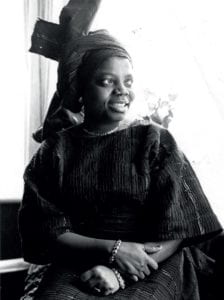
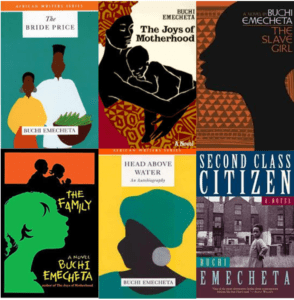
On October 23, the Library celebrated the opening of the Buchi Emecheta Space, a dedicated exhibition area on the second floor. An evening reception featured short talks by the Warden, Professor Frances Corner and Head of Library Services, Leo Appleton. They welcomed the eminent editor, writer and broadcaster Margaret Busby, OBE who shared her experience of being the first to publish Buchi Emecheta’s work in Britain, holding up her copy of the first edition of The Slave Girl, featuring the photographic portrait of the author by Val Wilmer. Angelique Golding concluded the presentations with a beautiful reading from Emecheta’s Joys of Motherhood that brought the power of her writing and her voice into the room.
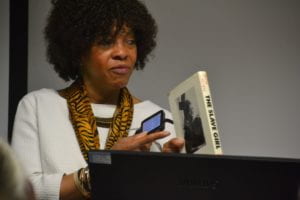
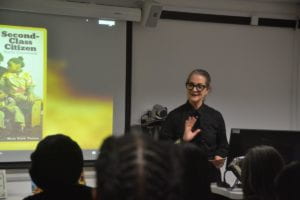
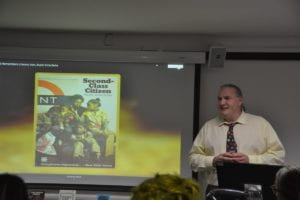
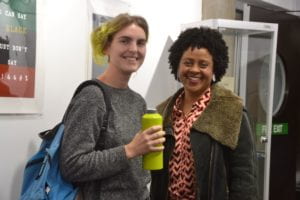
Margaret Busby – Co-Founder, Allison & Busby, Professor Frances Corner – Warden, Goldsmiths, University of London, Leo Appleton – Director of Library Services, Goldsmiths, University of London, Jessa Mockridge – Artist & Writer, Angelique Golding – Department Business Manager, Goldsmiths University of London & student of Black British Writing.
Florence Onyebuchi “Buchi” Emecheta OBE (21 July 1944–25 January 2017) was a powerful and defiant Nigerian British writer, teacher, mother, librarian and ‘African feminist’. She wrote prolifically authoring over 20 books, including: Second Class Citizen (1974), The Bride Price (1976), The Slave Girl (1977) and The Joys of Motherhood (1979). Emecheta’s writing defies easy categorization and is relevant to many communities: Womanists read her fierce motherhood and solidarity; Feminists, her bold independence. Queer readers pick up on her community building. Anti-racist activists celebrate her great pride in her culture and blackness. She is held up as a writer of both Nigerian and Black British identity and continues to inspire contemporary postcolonial writers. Bravery, outspokenness and determination shoot through her novels, plays, autobiography, children’s literature and critical writing.
The Buchi Emecheta Space sees the under-used lobby on the Library’s 2nd floor re-fitted to provide an additional display area in Rutherford Building to show projects developed from engagement with materials held in the Library, including Special Collections and Archives. The inaugural exhibition organized by the curatorial group Present Futures (a collaboration between curators Teal Baskerville, Kathy Cho and Loren Elhili) originated as a project drawing on the Women of Colour Index in the Women’s Art Library collection held in Special Collections. The show, titled ‘Becoming an archive’ is part of an ongoing project presenting the archive as a space of becoming for women and non-binary people of colour and features a wide range of practices, represented by documents, artist multiples, publications and videos. The exhibition also features a powerful new commission from Rebecca Bellantoni who held a flagmaking workshop during Black History Month.
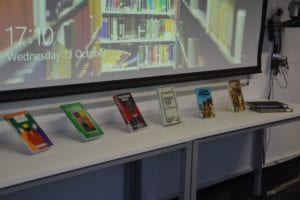
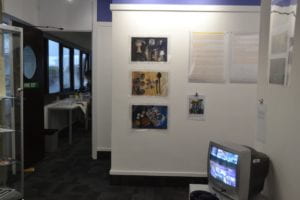
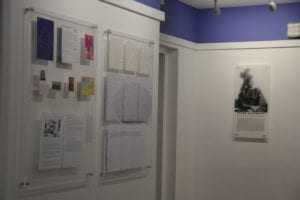
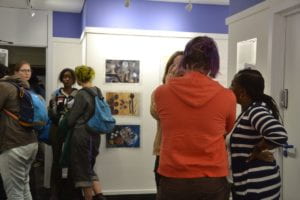
A plaque commemorating Buchi Emecheta is installed in the space alongside a dedication from Chimamanda Ngozi Adichie – ‘Buchi Emecheta. We are able to speak because you first spoke. Thank you for your courage. Thank you for your art. Nodu na ndokwa.’ Jessa Mockridge initiated the project to honor Emecheta with an exhibition she co-organized with Halima Haruna, titled “comeback mother : Buchi Emecheta” (April 2018, Kingsway Corridor, Richard Hoggart Building). This exhibition was an installation inspired by visiting Buchi Emecheta’s archive, preserved by her son, Sylvester Onwordi in London. Jessa worked directly with Sylvester and coordinated colleagues Laura Elliot, Althea Greenan and Nadine Plummer (Black British Writing MA) to visit the archives of manuscripts and ephemera, borrowing a selection for study back in Goldsmiths Special Collections. The exhibition included texts selected by Anqelique and Nadine. Jessa and Halima designed the publication “comeback mother” with reproduced handwritten and type writer notes lifted directly from Buchi Emecheta’s archive. Copies were distributed at the Buchi Emecheta Space opening event and spare copies are available from Special Collections and Archives, should you like one.
The evening featured a display of Emecheta’s books that are held in the Library and a soundtrack of Nigerian popular music. The evening brought together past and current students from the MA Black British Writing course to commemorate one of the most important black women writers published in the UK alongside one of the most important black women publishers, Margaret Busby, on Elizabeth William’s invitation.
The journalist Olatoun Gabi-Williams attended and has since written an excellent article for the Borders Literature web site which was also recently published in the Guardian Nigeria.
http://bordersliteratureonline.net/womendetails/Buchi_Emecheta
https://guardian.ng/art/when-goldsmiths-college-honoured-buchi-emecheta/
The Buchi Emecheta Space is open to students and staff wishing to work with materials from the Library or Special Collections, especially critical projects that broaden the curriculum and maintain the spirit of Emecheta’s appeal to many communities. Email Andrew Gray, Academic Services Librarian a.gray@gold.ac.uk for an exhibition proposal form.
Interning in the Library Systems Team
I’m Laura, a Goldsmiths graduate who completed a two-month internship in the Library Systems team this summer. Having been at Goldsmiths for three years and spending countless days and nights in the library studying for my degree, I had no idea how much work happens behind the scenes. I knew I wanted to work in the library because for me it’s a fundamental part of university life, and that this internship would give me a wide range of experience and transferable skills. I deliberated for ages over my application although it was much shorter than I was expecting, and then had an informal interview with my line manager and someone from the careers service who asked me about why I was suitable for the role. Despite the fact that I couldn’t open the bottle of water I was given as I sat down, I was given the job.
The systems team are currently working on implementing a new Library Management System after twenty years of using the same one, and are planning to go live with it in December. The system holds the details of every item in the library and every user who has an account, as well as lists of vendors and much more that I didn’t get to see, so as you can imagine transferring all this information and ensuring that the new system works for every need is a huge project. Some of the tasks I did were:
- I sat in on weekly meetings where the implementation team discussed updates on the configuring, testing and training of the new system. In the first meeting I didn’t understand much of what was being said, but over the coming weeks I gradually understood more after getting acquainted with both the old and new systems.
- I helped to train some of the staff in the new system, taking them through the interface step by step as it was the first time many of them had seen it.
- I created a questionnaire for the staff to complete in the usability of the new system, asking their opinion on how it looks and ease of use. Luckily the response was overwhelmingly positive.
- I tested the old system against the new to ensure that data had transferred correctly: this means looking at the log of random users and checking all the dates and personal information is correct. This is necessary work to make sure that any issues with migration is picked up.
I have great respect for the systems team as well as every other person that works in the library. They ensure that students have the resources they need and are able to access them, which I am eternally grateful for as I begin my MA at Goldsmiths in September. The women-led team whose roles are somewhere inbetween librarians and technicians are ensuring that the university functions and academics can do their research, and it was fantastic to see first-hand.

